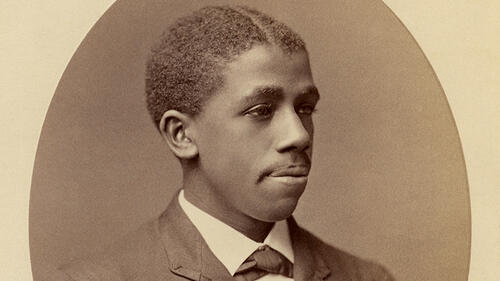
Yale Physics recognizes alumnus Edward Alexander Bouchet, a physicist and educator, for his career in teaching physics and devotion to science education.
Bouchet was born in New Haven, CT on September 15, 1852. He excelled in his studies, becoming valedictorian at Hopkins School. He then furthered his studies at Yale, concentrating in physics and mathematics, and becoming one of the first black students to graduate from Yale College, summa cum laude in 1874. He was elected to the Phi Beta Kappa Society, a prestigious academic honor society, in the same year.
Bouchet remained at Yale to obtain his doctoral degree in experimental physics in 1876–completing all requirements, including his dissertation on “Measuring Refractive Indices” in just two years–and was the first black person to earn a Ph.D. in any discipline from an American university. Bouchet was also among the first twenty Americans to receive a Ph.D. in physics and was the sixth American to earn a Ph.D. in physics in the Western Hemisphere. One of his professors, Arthur Williams Wright, was one of the first three (also at Yale Physics, in 1861).
After graduation, Bouchet headed the science program at the Institute for Colored Youth, a high school in Philadelphia, PA, for 26 years, teaching classes in physics, chemistry, astronomy, geography, and physiology. An advocate for improving science education, Bouchet repeatedly asked the school’s board of managers to provide laboratory space for students to perform individual experiments. In addition to his regular teaching, Bouchet gave lectures on various scientific topics for students and staff and even reached out to the wider community by giving public lectures on science.
In 1902 the high school ended their academic program in favor of vocational and technical training, following a philosophy made popular by Booker T. Washington and others, and Bouchet resigned. He then worked in various jobs around the country, including high school administration and teaching positions for the next 14 years until his retirement. Bouchet returned to New Haven for retirement, until he died in 1918. He was buried in an unmarked grave in the family plot in New Haven’s Evergreen Cemetery. A headstone was added, along with a ceremony, in 1998.
Yale and New Haven have recently furthered Bouchet’s legacy and raised awareness of his achievements to the current generation. In 2005, Yale and Howard University founded the Edward A. Bouchet Graduate Honor Society in his name. In 2017, the American Physical Society (APS) recognized the site of Bouchet’s Ph.D. work at Yale with a plaque as part of their Historic Sites initiative. Yale College has also established the Edward A. Bouchet Undergraduate Fellows Program to increase the number of students pursuing Ph.D.s and subsequent careers in academia who come from underrepresented backgrounds or have an interest in addressing racial disparities. And in 2021, artist Kwadwo Adae created a mural in New Haven to honor Bouchet.
Additionally, the APS annually confers the Edward A. Bouchet Award on some of the nation’s outstanding physicists for their contribution to physics.
This text has been adapted from text by Curtis Patton, Professor Emeritus, Epidemiology and Public Health, Yale University; a June 2007 article in APS News, and content on Wikipedia.